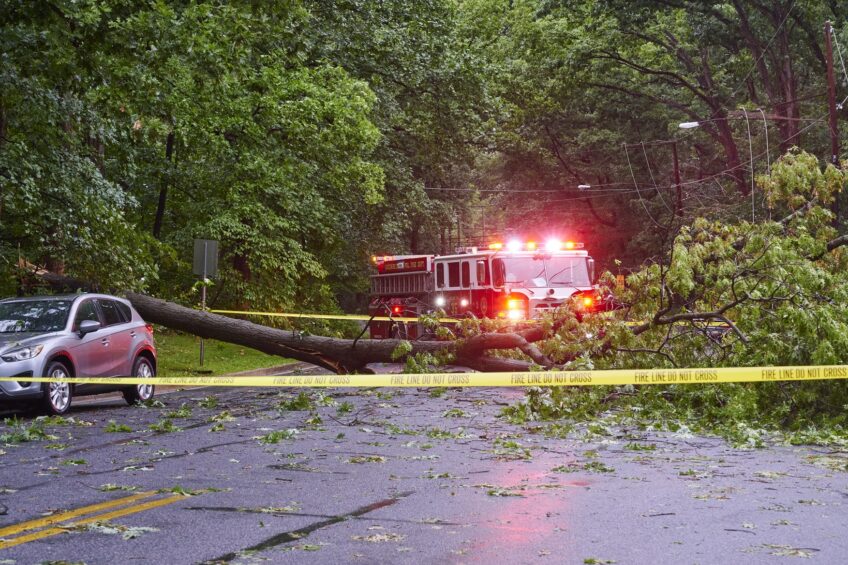Tornado warnings on August 7 led to early closures of federal offices, the University of Maryland and other workplaces in the metro area. But it was a series of summer storms the weekend of July 28 and 29 that interrupted moviegoers, swimmers and the postal service in Greenbelt. Pepco posted on July 30 on the social media platform X that 70,000 of its customers in Maryland and Washington experienced outages.
Summer power outages cause inconvenience and can be life-threatening. But they also highlight the vulnerability to severe weather of the electricity grid and the systems it powers.
Cynthia Brown, aquatic coordinator at the Greenbelt Aquatic & Fitness Center, said the Friday evening storm on July 28 shut down the motor to the outdoor pool’s filtration system overnight. Staff could not open the pool to the public until 1 p.m. the next day, after all 190,843 gallons cycled through the system.
“If you think about it the pool’s filtration system, it’s like the human heart,” Brown said. “The human heart pumps the blood through the body system so that it can function properly. It goes through our kidneys and it cleans everything out.”
Greenbelt’s indoor and outdoor pools have separate filtration systems that regulate the levels and distribution of chemicals in each pool, protecting swimmers’ health.
Storm-related power surges on Saturday, July 29 triggered back-to-back cooldowns of the projector in the Old Greenbelt Theatre’s main auditorium, during the second weekend of Barbenheimer, according to Lucy Cortez, operations manager and rental coordinator. Each cooldown, which prevents the bulb in the projector from exploding, takes about 10 minutes, so surges at 4:55 p.m. and 6:05 p.m. caused a half-hour of interruptions.
“It’s always funny to me,” said Cortez. “Whenever it’s predicted that there’s going to be rain is when we get more people.”
The U.S. Post Office on Ora Glen Drive lost power and was without internet for three days, according to Postmaster C. Tillery, after a power surge broke the internet service box. Staff were unable to make transactions until USPS IT personnel ordered and installed the part.
Brown, Cortez and Tillery each said outages are uncommon and highly dependent on weather.
But master electrician Steve Skolnik, of Greenbelt, said grid reliability “the consistent supply of electricity to meet demand” will become a “huge issue.”
The Maryland Department of the Environment identified “grid stability,” alongside reduced fossil fuel use, as a top priority in its June 2023 Maryland Climate Pathways Report and flagged intense storms as a particular threat climate change poses to the state.
Skolnik said that high winds and lightning strikes are the biggest threats to local electricity infrastructure. “As storms intensify, we’re seeing the kind of damage that you never used to see – but transition to cleaner energy, while necessary, will present additional challenges to grid reliability.” Large-scale use of electric vehicles and all-electric buildings increase electricity demand, which requires electric utilities to increase their capacity.
“If you park a hundred electric school buses in a parking lot … then the infrastructure you need to charge them all at the same time every day is going to be huge,” said Skolnik.
Because electric motors run more efficiently than gas and diesel engines, Skolnik believes that the transition is worth the cost of expanding grid capacity – even running on Pepco’s 2022 mix of less than 7 percent renewable energy sources in Maryland. According to the federal Office of Energy Efficiency and Renewable Energy, EVs run at more than 77 percent efficiency, while gas-powered vehicles run at 12 to 30 percent. Heating buildings with electricity rather than oil and natural gas will also present challenges, according to Skolnik.
“What that really means is that we’re going to need bigger electric services for our buildings and more capacity integrated in order to feed all these heat pumps that we’re going to be putting in,” Skolnik said. “Well, that’s a challenge for the future for sure.” He went on to say that “keeping the power on will require planning and policymaking and the fact that we’ve all grown up completely taking for granted that the power is [always] going to be on is a mistake I think we need to correct.”

